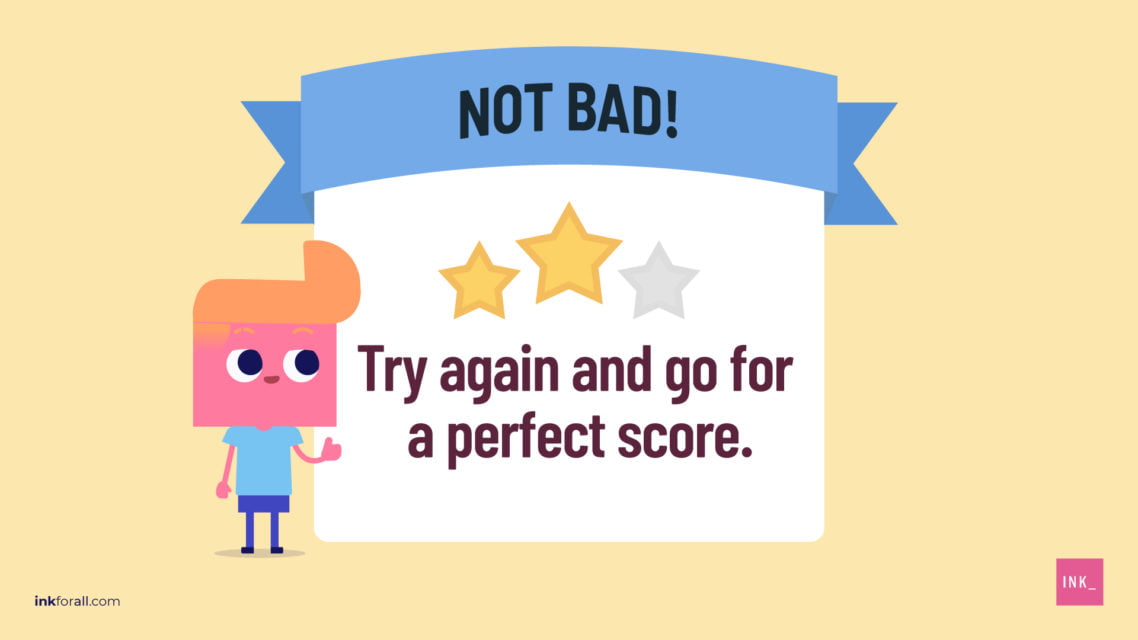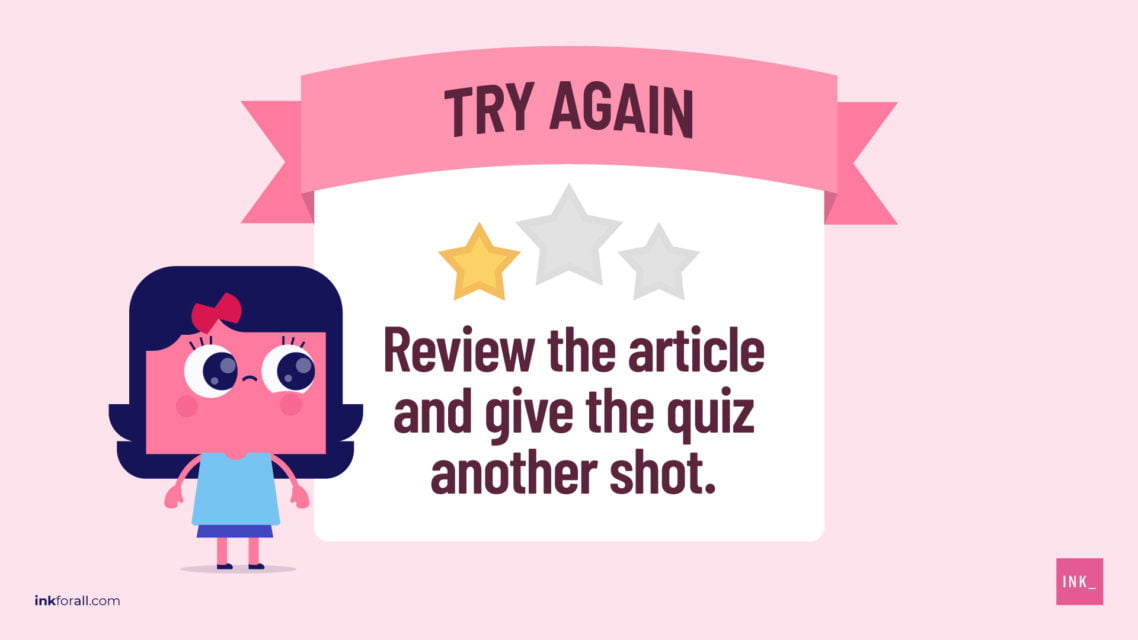Main Verbiage Takeaways:
- Verbiage is a noun with a negative connotation. It’s another word for excessive wordiness.
- This word often appears with the word excessive (“excessive verbiage“).
- Verbiage is the opposite of conciseness.
- When someone uses overly complicated words and phrases but doesn’t actually say much, that person uses a lot of verbiage.
- Verbiage is correct. Conversely, verbage is incorrect.
- Synonyms include circumlocution, pleonasm, verbosity, and long-windedness.
Sometimes it can be hard to find the right words; sometimes, you find too many. In the second instance, you might be guilty of verbiage. In this guide, we’ll explore the word verbiage — and we’ll tackle a common misspelling of the term. By the time you reach the end of this article, you’ll be a bona fide prolixity buff.
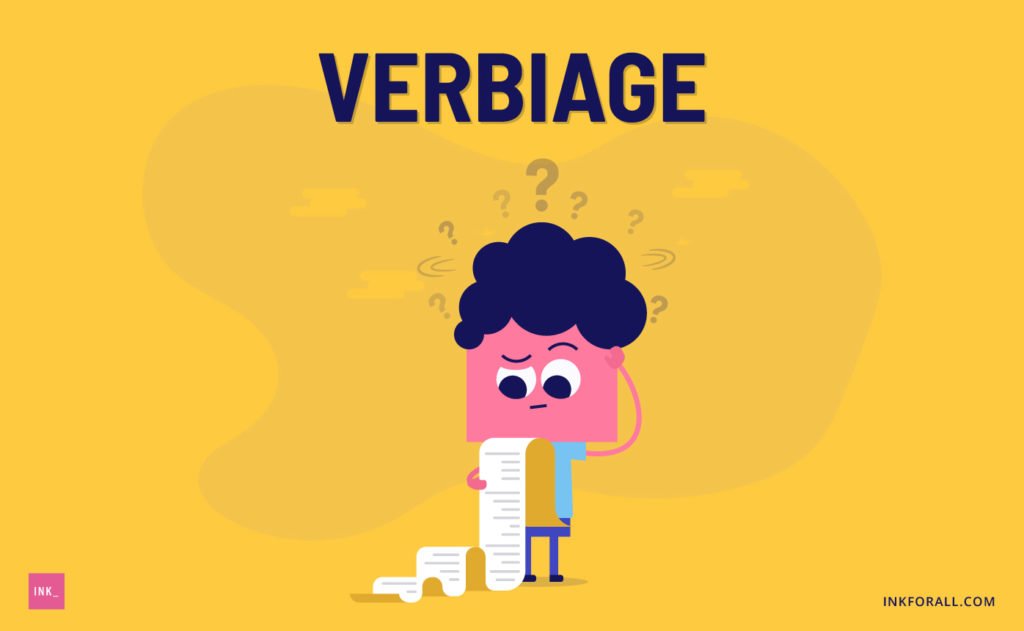

What is Verbiage in Writing?
Verbiage in writing means an excessive amount of technical words or overly complex phrasing. In this way, verbiage and conciseness are opposites. Verbiage can also mean expressive lingo or jargon. Or, refer to a person’s style of speaking. For example, purple prose is a type of verbiage. For logical arguments, there are four types of verbiage: Discount, Repetition, Assurances, and Hedge.
Is Verbiage Singular or Plural?
The plural form of the word “verbiage” should also be “verbiage” in the most commonly used context. That’s because native English speakers and writers use the word “verbiage” as a mass noun — or an uncountable noun. As such, it lacks a plural in ordinary usage and is not used with the indefinite article.
Similar examples of uncountable nouns include music, information, power, and water. So, saying “news stories about technology are full ofverbiage”makes as much sense as “news stories about technology are often full ofinformations.”
With that said, the plural form of “verbiage” can also be verbiages in a more specific context. For example, you can use the plural form in reference to “various types of verbiages” or “a collection of verbiages.”
How Do I Use Verbiage in a Sentence?
Here are examples of how to use verbiage in a sentence:
How to Pronounce Verbiage
In American English: VER-bee-edge
- VER – as in “vermin.” The emphasis goes on this first syllable.
- bee – as in the insect, or “honey bee“.
- edge – as in “the edge of a cliff“
In British English: Vuh-BEE-uhj
- Vuh – as in “love.” The emphasis goes on this first syllable.
- bee- as in the insect, or “honey bee“.
- uhj – like a softer “edge” as in “message“


What is Excessive Verbiage?
Excessive verbiage is a word, phrase, or statement that adds nothing to your argument. It may sound nice or appropriate but the information is actually superfluous. Always aim to eliminate excess verbiage to be as concise as possible. This helps make your argument clear, and in turn, easier for your audience to follow and consider.
What is an Example of Verbiage?
Verbose writers use a lot of text to describe simple things. Some authors get away with verbiage: WilliamShakespeare, for example, wrote notoriously wordy plays. Take this quotation, for example, where Polonius tells his daughter Ophelia to stop seeing Hamlet:
Have you so slander any moment leisure,
As to give words or talk with the Lord Hamlet.”
Unless you’re The Bard of Avon, it’s better to err on the side of caution.
Is Verbage a Word?
Verbage is a word, but it is not a standard word with clear origins. For example, verbage is probably a portmanteau, or a mashup, of verbiage and garbage. It may appear as a rare alternative spelling for verbiage. Or, some may mistakenly use verbiage and verbage interchangeably. Nevertheless, both words have similar meanings as well as negative connotations. However, verbiage is the most correct version.
What is Correct: Verbage or Verbiage?
Verbiage is the correct word, not verbage. Both words refer to the excessive use of unnecessary words or complicated phrasing. Both words carry negative connotations. However, verbiage is the most correct spelling while verbage is a non-standard word that is probably a fusion of verbiageand garbage.
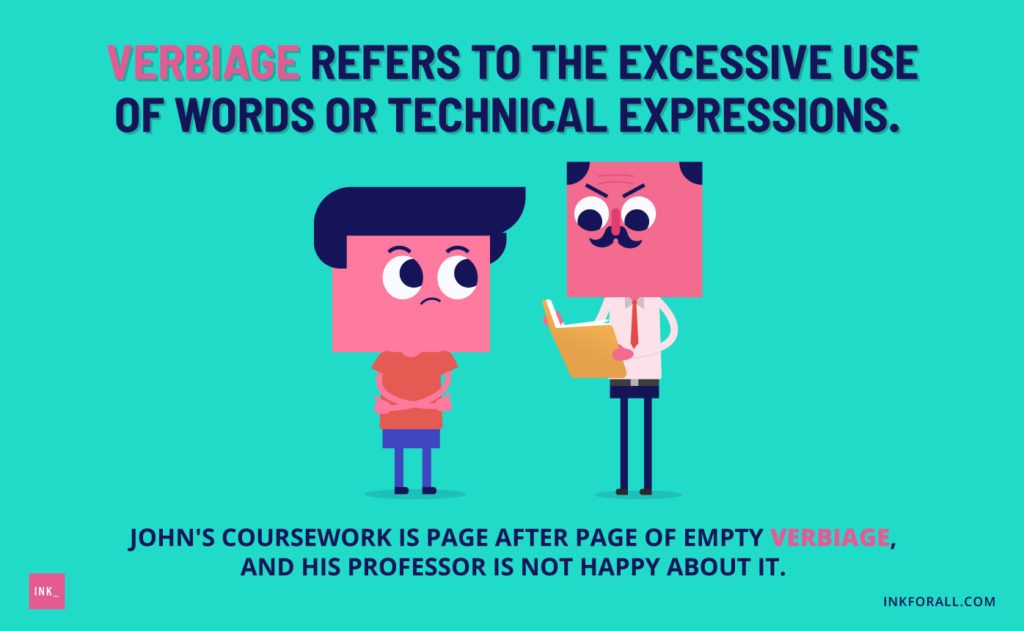

What is an Antonym for Verbiage?
Words that are opposite in meaning to verbiage are conciseness, directness, terseness, plainness, and straightforwardness. Other antonyms include:
- Brevity
- Briefness
- Compactness
- Crispness
- Pithiness
- Succinctness
- Terseness
- Compression
What is Another Word for Verbiage?
Another word for verbiageis verbosity. Other synonyms for the word verbiage include circumlocution, expansiveness, long-windedness, floridity, loquacity, periphrasis, pleonasm, and prolixity.
Here are examples that use verbiage synonyms:
Now you know the definition of the word verbiage, and you’re familiar with all its most common synonyms. You know why it’s important to avoid excessive wordage and when to use appropriate technical jargon. Great! Go forth and conquer the writing world, verbiage whiz!
Take This Quiz to Know how Well you Know Verbiage
Verbiage Means Question #1
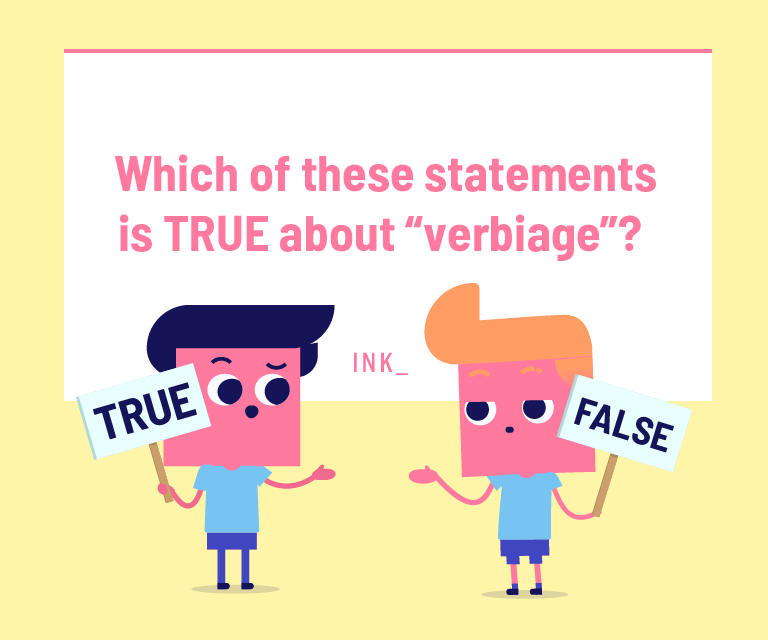

The answer is D. “Verbiage” is a profusion of words. But it can also mean expressive lingo or jargon.
Verbiage Question #2
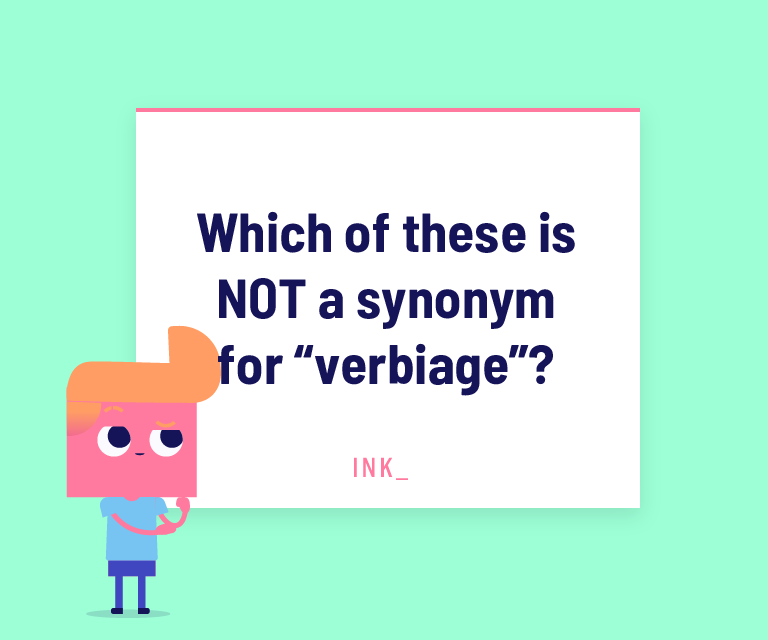

The answer is B. “Verbage” and “verbiage” don't have the same meaning. “Verbage” is most likely a fusion of verbiage and garbage.
Verbiage Definition Question #3
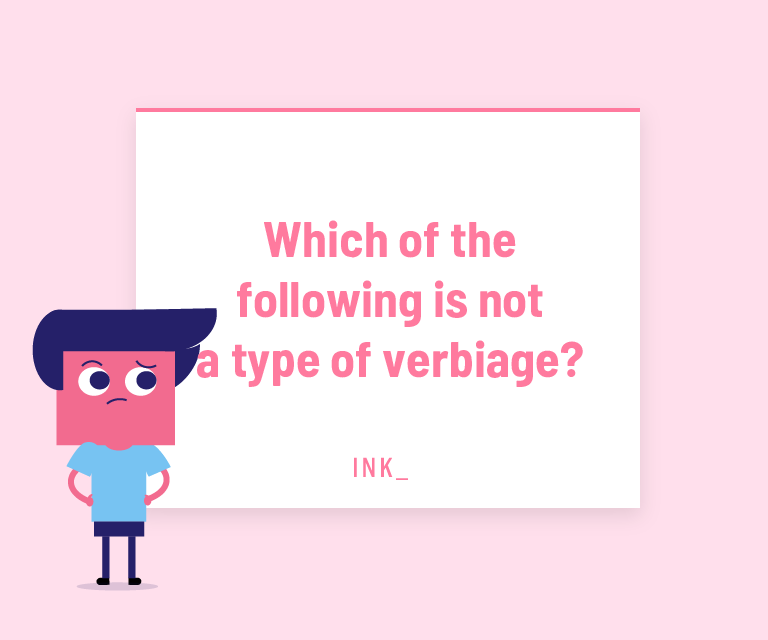

The answer is B. For logical arguments, there are four types of verbiage: Discount, Repetition, Assurances, and Hedge.
Verbiage Question #4
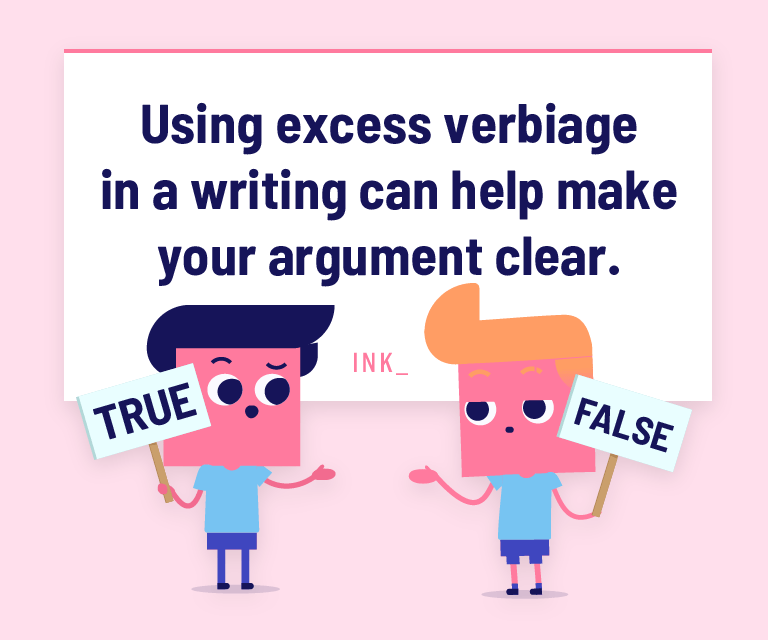

The answer is FALSE. Excessive verbiage consists of words, phrases, or statements that add nothing to your argument.
Define Verbiage Question #5
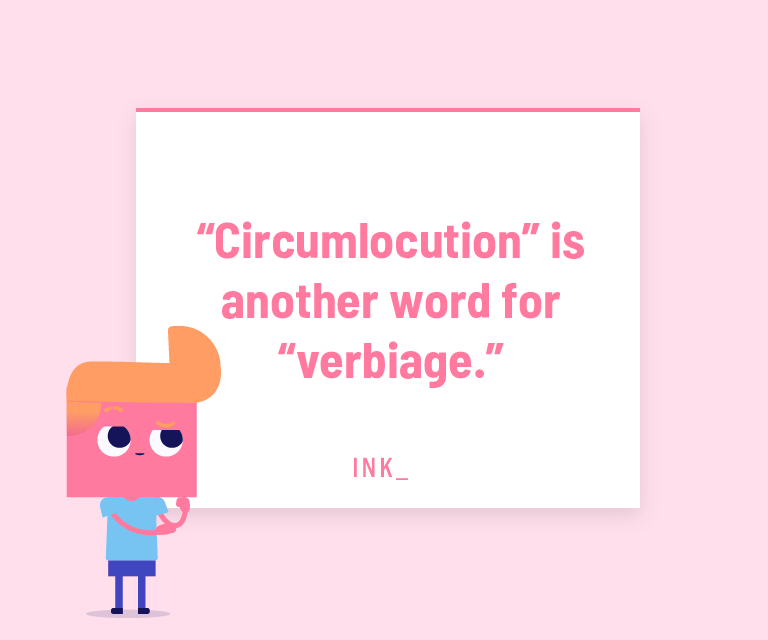

The answer is TRUE. Circumlocution means the use of many words when few would do.


